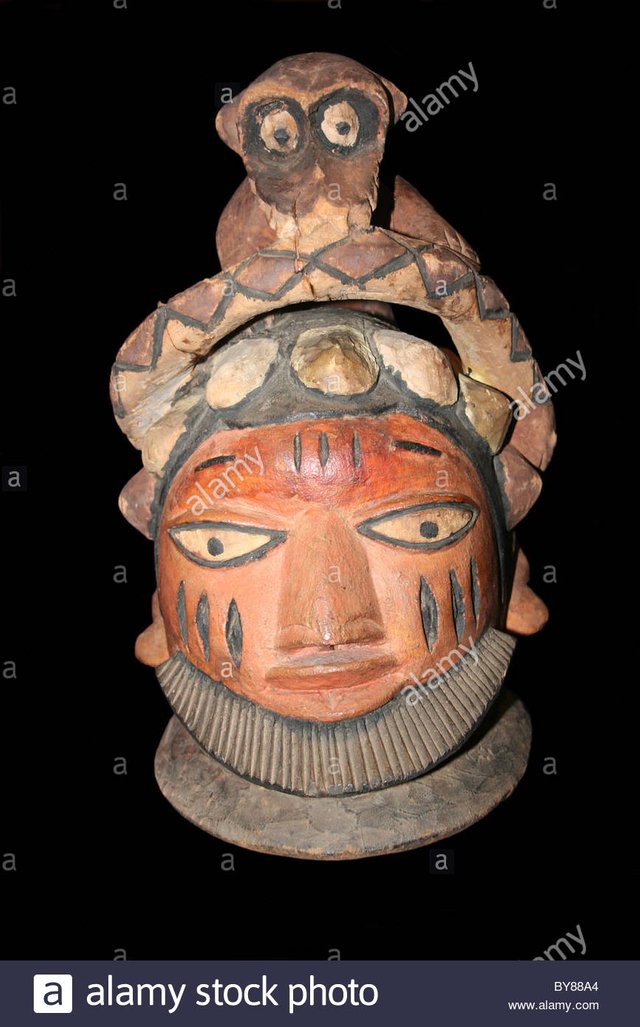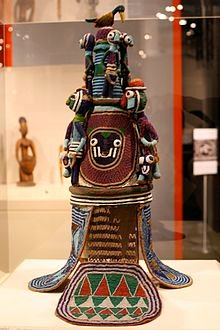
SOURCE:ALAMY
Yoruba’s originated from Ile-Ife, they arose and became quite popular for their trading with the The Yoruba’s are the second most populous tribe in Nigeria (most populated black nation on earth). The Portuguese, which gave them a large supply of ammunitions in return for raw materials and slaves.
The Yoruba’s occupy mostly the Western part of Nigeria. They have developed a variety of different artistic forms including pottery, weaving, beadwork, metalwork, and mask making.
The ''Yoruba’s'' are the linage of Ham who was the third son of Noah (Biblical account). They are the direct ancestors of Cush, the son of Ham, and the black Cushite migrants and settlers that refused to go to Africa with the other descendants of Cush and his son Nimrod but that rather chose to settle in the ancient Cities of Mecca and Medina in what is presently known as Saudi Arabia. They were there as settlers for thousands of years and they constituted a prosperous powerful, large and respected minority within the larger Arabian community.
But they were forced out of those Arab speaking towns and villages and forced to leave them for refusing to give up their religious belief as we all know the Arabs are mostly Islam’s. then they moved to the banks of the longest river in Africa(river nile) where they associated and began to rapport with the Egyptian Arabs(pharaohs) , the Nubians and the Sudanese of the Nile. Many remained there but the majority of them eventually moved to what is now known as the north-eastern zone of Nigeria and once again associated and married with the Shuwa Arabs and the Kanuris of the Borno people. From there they eventually moved down south to the rainforests of what is now known as south-western Nigeria making their primary place and location of pagan worship Ile-Ife (known as the ancestral home of the Yoruba’s). The establishment of Ife as the center of all that is Yoruba was confirmed by Oduduwa (Yoruba mythology) himself when he sent his sons out from Ife to other parts of Yoruba land to establish their own independent and sovereign kingdoms.
However, they were unable to push back the Fulani who invaded them and pushed much of the Yoruba to the south.

In the early 1900s, the Yoruba’s formed an accord with the Fulani and by 1901 they were colonized by the British (later became Nigeria’s colonial masters. Because of their enmity with the Fulani who are the great Islamic evangelists and propagandist, most of the Yoruba people do not hold to the Islam faith.
The Yoruba’s economically as a people primarily engage in agriculture and trading, with about 20-25% of the people employed as traders or artists and craftsman.
Funny enough the word Yoruba has no meaning in the Yoruba language or any other language on the entire planet earth. Nobody has been able to tell the meaning of Yoruba or where the word came from. Till today it’s still a mystery. For all we know it could even be an ancient jibe. That is why most yorubas always prefer to be referred to as an ''Ife'' rather than a ''Yoruba'' really confusing.
Yoruba people ethnic group in Africa if not one of the largest, and the majority all almost all of them speak the Yoruba language. The Yoruba’s makes up to 35-37% percent of Nigeria’s total population, and about 40-50 million individuals throughout the region of Africa.
A large percentage of the African populace enslaved during the Transatlantic Slave Trade in the Caribbean’s and America managed still maintained the Yoruba spiritual religion known as Aborisha.
This Aborisha spiritual religion offered a route to all people of African descent, who were victims of slave trade in the Americas or the Caribbean, to make claim to Yoruba heritage which they all gladly did.
The following states are predominantly Yoruba’s state in Nigeria; Ekiti, Lagos, Ogun, Ondo, Osun, and Oyo.
The yourba ethnic group are headed by an Oba (King) or Baale (a nobleman or mayor). Main Yoruba cities and towns include Ile-Ife, offa,Ibadan, Lagos,badagry Ijebu Ode, Abeokuta, Akure, Ilorin, Ijebu-Igbo, Ogbomosho, Ondo, , Ado-Ekiti, Osogbo, Iles etc. There are other Yoruba cities and towns such as Ketu, Sabe, Dassa and others in Republic of Benin.